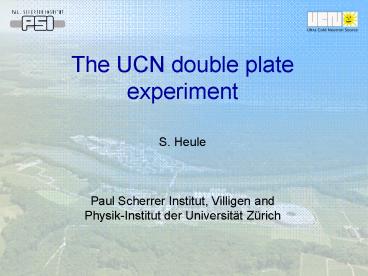Folie 1 PowerPoint PPT Presentation
1 / 22
Title: Folie 1
1
The UCN double plate experiment
S. Heule Paul Scherrer Institut, Villigen
and Physik-Institut der Universität Zürich
2
Ultracold neutrons
- Ultracold neutrons (UCN) are free neutrons which
are reflected on certain materials under any
angle of incidence - Purpose measurement of fundamental properties of
the neutron
Properties Have kinetic energies in the 100 neV
range Move with velocities of few m/s
3
Interactions
- The four fundamental interactions
- Gravitational interaction VG mngh
- 100 neV m-1
- Magnetic interaction VM -µ B
- 60 neV T-1
- Weak interaction
- beta decay of the neutron
- Strong interaction with nuclei
- Fermi potential up to 300 neV
- Description potential step
- ?reflection on surfaces / walls ? UCN storage
4
Fermi potential
- Reflection on walls
vnvC
vn
vn
VFermimvC2/2
5
UCN wall materials
UCN source
diffuse reflection
UCN experiment
specular reflection
5-6 m
- High Fermi potential
- Low loss probability per wall collision
- For UCN guides Specular Reflectivity
- Diffuse reflection leads to storage effect /
decreased transmission
6
Wall materials
- Good wall materials have a Fermi potential above
250 neV, e.g. - Beryllium
- Nickel (natural, 58Ni)
- Non-hydrogenated diamond-like carbon (DLC)
7
Testing surfaces
- UCN guides Highly specular reflection required
- Idea Reflectometry with many reflections
- Test under real conditions use UCN
- The solution
- The double plate experiment
8
The parallel plates experiment
- of reflections determined by gap of the plates
S2
S3
S1
S4
D2
D1
9
Setup at ILL
10
Sample plates
- Length 500 mm
- RMS-roughness determined by atomic force
microscopy (AFM, 1µm x 1µm) - Floatglass
- Untreated (RRMS0.9 nm)
- HF etched (RRMS1.2 nm)
- Sand-blasted
- Nickel
- Coating on Floatglass
- PSI (RRMS1.6 nm)
- S-DH Heidelberg (RRMS0.25 nm)
- Diamond-like carbon
- From Fraunhofer IWS Dresden (by Ion beam sputter
deposition, RRMS0.6 nm) - Stainless steel (RRMS1.6 nm)
11
first analysis steps
- Subtraction of separately measured background for
both detectors - Normalized rates D2/D1
- Compensate for fluctuations in the neutron flux
- n(d) calculated from the plate distance
- Angular acceptance determined by apertures S1 and
S2
12
Simple model
- Loss factor per wall collision
- Non-specularly reflected UCN are lost
- I(d)I(n)I0 Rn
- Incident rate I0 should be the same for all
samples
I00.87
I00.24
13
Micro roughness
- Textbook model developed by Steyerl and
Ignatovich - Small surface irregularities lead to constructive
interference of scattering from different depths
of the surface layer - Leads to conditions which are satisfied for the
double plate experiment if RRMS 5 nm - Two characteristic numbers RMS-roughness and
correlation length
14
Probability diffuse scattering
- RRMS1 nm, Lcorr25 nm, ?I50, En200 neV,
VFermi252 neV
z
?
y
F
x
According to A. Steyerl, Z. Physik 254 (1972)
169-188
15
Integral probability
- RRMS1 nm, Lcorr25 nm, VFermi252 neV
vnvC
According to A. Steyerl, Z. Physik 254 (1972)
169-188
16
Test 1 converging plates
- Smallest angle (36) is transformed to 90 at
0.24 converging angle of upper plate(gap 5 mm) - For all samples
- Rates above0.24 aresignificantlyabovebackgrou
nd
17
Test 2 Variation of S4
- Double slit aperture S4 is replaced by a bar or
removed completely
NiHD Ni 5/10
18
Converging angle
- Systematic variation of the RMS roughness shows
agreement with measurement at R1 nm
Sample Ni HD
19
S4 variation
- Systematic variation of the RMS roughness shows
agreement with measurement at R1.4 nm
Sample Ni HD
20
Conclusions
- UCN double plates experiment performed at ILL
Grenoble - Preliminary analysis shows significant fractions
of diffuse reflection for various samples - Diffuse reflection can be explained qualitatively
by the Micro roughness model
21
Acknowledgement
- The work was performed at the Paul Scherrer Instit
ut, Villigen, Switzerland and at the Institut
Laue-Langevin, Grenoble, France - Thanks to all who contributed to the double plate
experiment - This work is supported by the Swiss National
Science Foundation (SNF, grant 200021-105400) - Information about UCN_at_PSI onlinehttp//ucn.web.p
si.ch
22
The PSI UCN source
rexpgt 1000 cm-3
Diamond-LikeCarbon coatedUCN guides
- Requirements
- High Fermi potential
- Low losses on wall collisions
- Specular reflection
rUCN6000cm-3
2 mA,600 MeVproton beam1 duty cycle
3 m3 D2O

